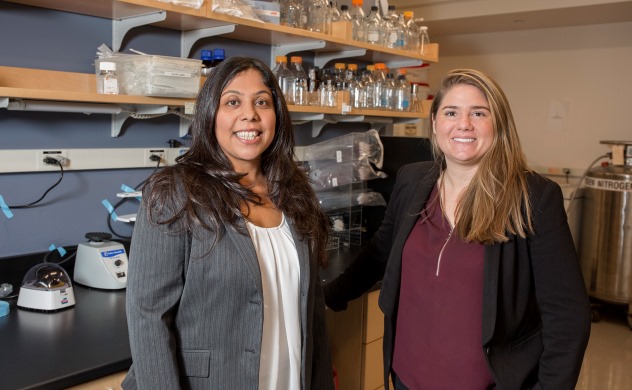MUCOSAL IMMUNOLOGY & BIOLOGY RESEARCH
Jain Lab: Nitya Jain, PhD
Contact Information
Jain Lab
Building 114, 16th Street
Charlestown,
MA
02129
Phone: 617-726-4171
Email: njain@ccib.mgh.harvard.edu
Assistant Investigator, Mucosal Immunology and Biology Research Center, Massachusetts General Hospital
Assistant Professor of Pediatrics, Harvard Medical School
Explore This Lab
Overview
Postnatal Immunity Research
Approximately four million children under the age of six months die each year worldwide because of infections. Infants in developed countries, on the other hand, have become increasingly sensitive to acquiring autoimmune diseases such as Type 1 diabetes as well as allergies and asthma.
Most vaccination strategies are targeted to the post-natal stage, and immunized infants do develop protective immunity to diseases such as measles and mumps. Thus, the immune system of a neonate can mount various responses ranging from deficient (in infections) to deviant (in autoimmune diseases) to mature (in response to vaccines).
The environmental and host factors dictating this plasticity in neonatal immune function are not well defined. The Laboratory of Nitya Jain, PhD, at Massachusetts General Hospital is working to Understand how the immune system develops and operates in newborns for the development of new approaches to improve the health of infants around the world.
Research Projects
Microbiota and Immune System Development
We are interested in determining the impact of postnatal intestinal microbial colonization on developmental events in the distally located thymus. Specifically, we are investigating which developmental pathways are impacted by intestinal microbiota and what are the mechanisms of thymic-intestine crosstalk.
Vitamin D and Early-Life Immunity
Vitamin D regulates several aspects of immune function as well as the intestinal microbial composition. We are interested in understanding the link between Vitamin D, the postnatal microbiota and early immune development. We are particularly interested in the role of the nuclear receptor RXRA in regulating the Vitamin D response in developing immune cells.
Lab Members

Principal Investigator
Nitya Jain, PhD
Assistant Immunologist, Department of Pediatrics, Massachusetts General Hospital
Assistant Professor, Harvard Medical School
Staff
Kara Clerkin, Research Technician
Maria Ennamorati, Undergraduate Student
Kaitlin Berry, Undergraduate Student
Publications
Selected Publications
Jain, N.*, Walker, WA. (2014) Diet and host-microbial crosstalk in postnatal intestinal immune homeostasis. Nat Rev Gastroenterol Hepatol. 2015 Jan;12(1):14-25. doi: 10.1038/nrgastro.2014.153. Epub 2014 Sep 9. (*corresponding author)
Jain, N., Miu, B., Jiang, J.K., Prince, A., Greiner, D., Thomas, CJ, Sanderson, M.J., Berg, L.J. & Kang, J. (2013) CD28 and ITK signals regulate autoreactive T cell trafficking. Nat Med. 2013 Dec;19(12):1632-7. doi: 10.1038/nm.3393
Jain, N., Nguyen, H., Chambers, C.A. and Kang, J. (2010) Dual function of CTLA-4 in regulatory T cells and conventional T cells to prevent multi-organ autoimmunity (2010). Proc Natl Acad Sci U.S.A. 2010 Jan 26;107(4):1524-8
Jain, N.*, Nguyen*, H., Friedline, R., Malhotra, N., Brehm, M., Koyonagi, M., Bix, M., Cooper, .JA., Chambers, C.A. and Kang, J. (2009) Disabled-2 is a FOXP3 target gene required for regulatory T cell function. J Immunol. 2009 Oct 1;183(7):4192-6. (*co-author)
Bodas M.*, Jain N.*, Awasthi A., Martin S., Penke Loka R.K., Dandekar D., Mitra D., Saha B. (2006) Inhibition of IL-2 induced IL-10 production as a principle of phase-specific immunotherapy. J Immunol. 2006 Oct 1;177(7):4636-43. (*co-author)
Awasthi A., Mathur R., Khan A., Joshi B.N., Jain N., Sawant S., Bopanna R., Mitra D. and Saha B. (2003) CD40 signaling is impaired in L. major infected macrophages and is rescued by a p38MAPK activator establishing host-protective memory T cell response. J Exp Med. 2003 Apr 21, 197(8): 1037-43.
